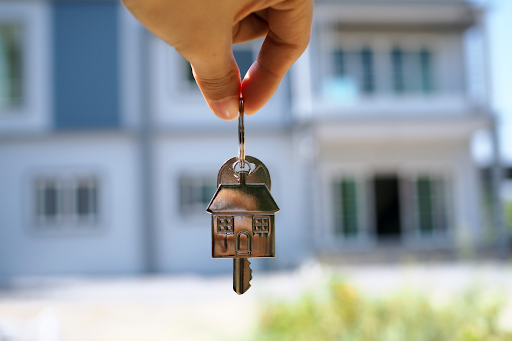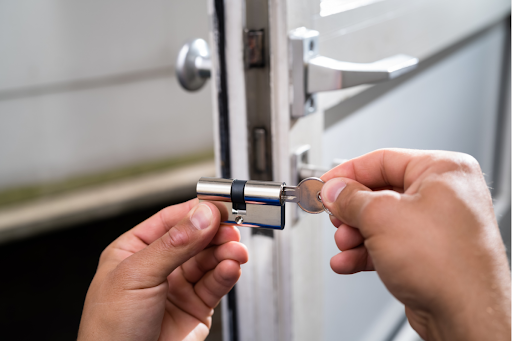To sign up for our daily email newsletter, CLICK HERE
Securing your home is a top priority for every homeowner, and selecting the right lock is a crucial aspect of home security. With various options available in the market, choosing the best lock can be overwhelming. This comprehensive guide will walk you through different types of locks, their features, and what to consider when making your decision to ensure your home is well-protected.
Types of Locks
- Deadbolt Locks
Deadbolt locks are among the most secure and commonly used for residential properties.
They come in two main types:
Single Cylinder Deadbolt
Operated with a key from the outside and a thumb turn from the inside. Ideal for doors without glass panels nearby.
Double Cylinder Deadbolt
Requires a key to open from both inside and outside. This type enhances security but can be hazardous in emergencies where a quick exit is needed.
- Knob Locks
Knob locks are often found on residential doors, but they are generally used in conjunction with deadbolts as they are less secure on their own. The lock cylinder is within the knob, making them vulnerable to forceful entry methods.
- Lever Handle Locks
Lever handle locks are typically used for interior doors but can also be adapted for exterior use with the right security features. They are easier to operate than knob locks, especially for individuals with physical disabilities.
- Smart Locks
Smart locks offer advanced security and convenience by allowing you to lock and unlock your door using a smartphone, keypad, or biometric data. They often come with additional features like remote access, temporary digital keys, and activity logs. Some popular types include:
Bluetooth-Enabled Smart Locks
Use your phone’s Bluetooth to unlock the door when you are in close proximity.
Wi-Fi-Enabled Smart Locks
Allow you to control your lock remotely via the internet.
Fingerprint Locks: Use biometric data for access, providing high security and ease of use.
- Mortise Locks
Mortise locks are robust and offer high security. They consist of a flat, rectangular box that fits into a recess in the door, with a lock body that provides added strength. These are commonly found in commercial buildings but can also be used in residential properties for enhanced security.
- Cam Locks
Cam locks are typically used for securing items like filing cabinets, mailboxes, and lockers. They are simple to use and can be opened with a standard or tubular key.
- Rim/Mortise Cylinder Locks
These locks are used in conjunction with other locks, providing additional security. Rim cylinders are mounted on the inside of the door, whereas mortise cylinders fit into a mortise lock set within the door.

Factors to Consider When Choosing a Lock
- Security Needs
Assess the level of security you need for different areas of your home. For exterior doors, higher security locks like deadbolts and smart locks are preferable, while interior doors may require less robust solutions.
- Type of Door
The type and material of your door can influence your lock choice. Solid wood or metal doors can support heavier, more secure locks like deadbolts and mortise locks, while hollow-core doors may not be suitable for these types.
- Ease of Use
Consider who will be using the lock. Smart locks and lever handle locks are easier to operate for individuals with disabilities or elderly family members.
- Aesthetics
While security is paramount, the look of the lock should complement your home’s design. Many locks come in various finishes and styles to match your decor.
- Budget
Locks come in a wide price range. Balancing cost with your security needs is essential. Investing in high-quality locks can prevent potential losses from break-ins.
- Installation
Some locks are more challenging to install than others. Deadbolts and smart locks might require professional installation, while simpler locks like knob or lever handle locks can often be installed by the homeowner. You can contact a residential locksmith for professional home lock installations.

Frequently Asked Questions (FAQ)
- What is the most secure type of lock for a front door?
Deadbolt locks, especially double cylinder deadbolts, are considered very secure for front doors. For added convenience and security, consider smart locks with robust encryption.
- Are smart locks safe to use?
Yes, smart locks are safe, provided they are from reputable manufacturers and include features like encryption and two-factor authentication. Regularly updating the lock’s firmware can also enhance security.
- Can I install a new lock myself?
While some locks can be DIY projects, it’s often best to have a professional install more complex locks like deadbolts and smart locks to ensure they are correctly fitted and provide optimal security.
- How often should I replace my locks?
Locks should be replaced if they show signs of wear, after moving into a new home, or following a security breach. Regular maintenance and periodic updates to smart lock firmware can prolong their effectiveness.
- Do all locks fit all doors?
No, locks are designed to fit specific door types and thicknesses. Always check the lock specifications and measure your door to ensure compatibility.
Conclusion
Choosing the right lock for your home involves assessing your security needs, the type of doors, ease of use, aesthetics, and budget. By understanding the various types of locks available and considering these factors, you can make an informed decision that enhances your home’s security.
For professional advice and installation services, consider reaching out to Jones and Sons Locksmith. They offer a wide range of residential locksmith services and can help you choose and install the best lock for your needs. If you have any questions or need further assistance, don’t hesitate to contact them.
Investing in the right lock is an essential step in securing your home, protecting your loved ones, and ensuring peace of mind. Make your home a safer place by choosing a lock that combines security, functionality, and style.